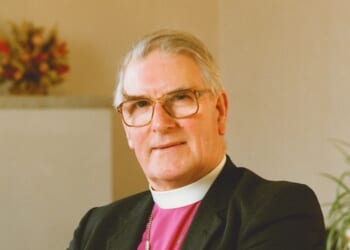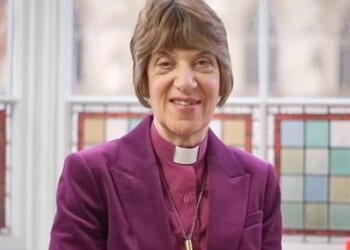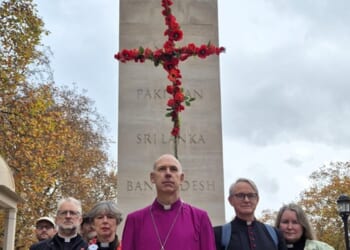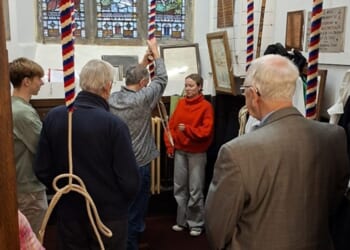AS A Roman Catholic child living on the Franco-German border, I learned the language of faith long before I understood its meaning. Words such as “holy”, “glory”, and “virgin birth” were markings on a page: recited, familiar, and yet curiously lifeless. They were the “dead words” of childhood religion: phrases heard by rote before I had developed the interior space, maturity, or imagination to receive them.
When I was 11, after a traumatic move to England, I found a tiny leather-bound book of daily Bible readings in a chest of drawers which had come with the house. The handwritten dedication, from Sister Kevin to her dear friend, came from Galatians 2.20: “I am crucified with Christ: nevertheless I live; yet not I, but Christ liveth in me.”
I glanced at it, then put it back. At that point, the words meant nothing to me. In the years that followed, I looked for spiritual meaning everywhere else: in Tarot cards, in New Age practices, Marion Zimmer Bradley’s novel Mists of Avalon — anywhere that might offer a sense of connection.
It was not until much later, through a journey shaped by marriage, motherhood, the 12-step programme, and difficult times when we were in “the financial woods”, that scripture began to unfold for me. First, through church, and then through that same little book, rediscovered in my mid-thirties in the same place as I had left it. I did not truly open it, though, until my early forties, as I needed to open myself to do so. The inert became luminous.
This is what I have come to understand as living words: passages that reveal new depth as we grow, awakening when our own consciousness expands enough to receive them. Faith, then, is less about remembering the right words and more about a quiet recognition that sits alongside intellectual engagement.
Recently, I read a verse that I’d read many times over the years, but, this time, it leapt off the page. In Luke 17.20-21, the Pharisees ask Jesus when the Kingdom of God will come. He replies: “The Kingdom of God cometh not with observation: neither shall they say, ‘Lo, here!’ or, ‘Lo, there!’; for behold, the Kingdom of God is within you.”
Jesus refuses to locate the Kingdom in external signs. Instead, he insists that divine life is disclosed inwardly, not outwardly. The Kingdom does not arrive as an event to be witnessed, but emerges as an awareness to be awakened.
A similar dynamic unfolds in Jesus’s exchange with the Sadducees (Luke 20.27-38), in which they question him about a woman married in sequence to seven brothers. They want a literal answer: whose wife will she be at the resurrection? Jesus reframes the entire conversation, saying that those who enter the age to come are “like the angels”, and that “God is not the God of the dead but of the living.” The categories of mortal existence no longer apply. Resurrection is not an extension of biological life, but a transformation of being.
Both passages point toward a deeper truth: divine reality is not perceived through external observation. It becomes visible only as the inner life awakens to it. The Kingdom and resurrection are not spectacles, but dimensions of reality disclosed through spiritual discernment.
CURIOUSLY, some of the most helpful metaphors for understanding this come from modern physics. I am not suggesting that the teaching of Jesus anticipated quantum theory, but, rather, that science sometimes offers images that allow modern readers to grasp ancient spiritual insight.
In quantum mechanics, a particle does not exist in one defined state until it is observed. When unobserved, it remains in a wave-like state: dispersed, non-local, holding multiple possibilities. Observation collapses that wave into a particle, making something potential become something actual.
This offered me a new way of thinking about Jesus’s teaching: the Kingdom does not come with observation. Unperceived, the Kingdom is like a wave: everywhere and nowhere. It is within you and all around you, a field of divine potential.
Perceived inwardly, it collapses into reality to become lived experience, meaning, and action. But faith in both inward perception and outward potential is the linchpin. In this sense, consciousness becomes the meeting point between divine possibility and human participation.
The physicist Carlo Rovelli illuminates this further. In The Order of Time (Allen Lane, 2018), he writes: “Time is not a line with two equal directions: it is an arrow with different extremities.” Elsewhere, he writes: “The world is not a collection of things, it is a collection of events. The difference between things and events is that things persist in time, events have a limited duration. A stone is a prototypical ‘thing’: we can ask ourselves where it will be tomorrow. Conversely, a kiss is an ‘event’. It makes no sense to ask where the kiss will be tomorrow. The world is made up of networks of kisses, not of stones.”
“We understand the world in its becoming”, he says, “not in its being”.
Einstein echoes this. In a letter written late in life, he remarked: “The distinction between past, present, and future is only a stubbornly persistent illusion.”
THESE insights do not prove theology, but they create an imaginative landscape in which Jesus’s teaching makes new sense. If time is not linear, if human identity is not fixed, if the universe is made of events rather than objects, then resurrection as transformed life and the Kingdom as an interior reality become far more intelligible to the modern mind.
Words that once felt dead come alive. Meanings surface when we are ready. Verses that lay dormant for decades suddenly illuminate the path ahead. It is not the Bible that changes, nor God, but us.
And this is the quiet challenge of Jesus’s teaching: our instinct is always to look outward — for signs, proof, certainty. But Jesus says the opposite: the Kingdom is not here or there. It is “within you”: not possessed, but perceived; not controlled, but revealed; not imposed from outside, but awakened from within.
Every moment of compassion, clarity, surrender, or insight is a wave collapsing into a particle, a glimpse of divine life becoming real. Every scripture verse that stirs awake is evidence that the Kingdom has already begun to take shape; for the God we meet in Christ is, indeed, the God of the living. And the life that he offers is not measured in time, but in awakening.
Madeleine F. White is a poet, novelist, and editor. She is the founder and editor of the magazine Write On! and Strategic Partnerships Lead at libraro.com.

















